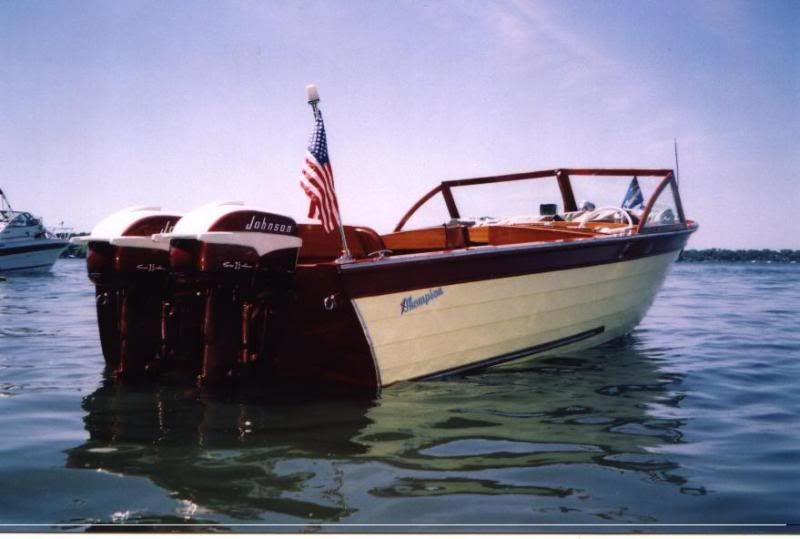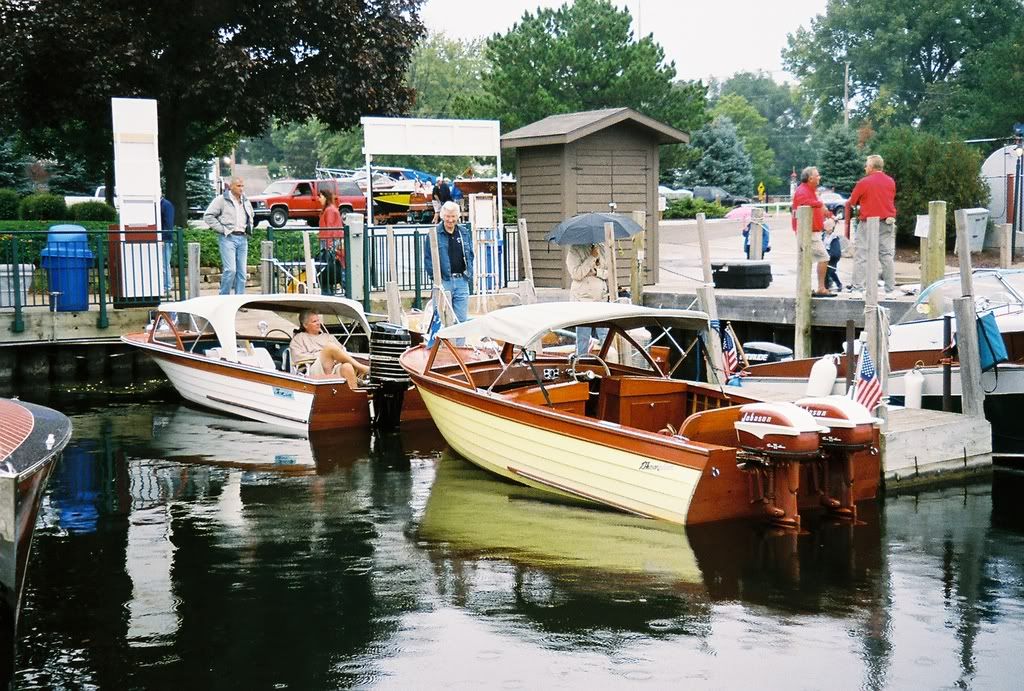new thompson boat owner
Moderators: a j r, TDockside, Miles, Moderators
-
1958 tommy
- Posts: 10
- Joined: Thu Jun 17, 2010 11:02 pm
- Location: olympia washington
new thompson boat owner
hello to all and thanks for the wisdom, well i am replacing the transom and i took a sawsall and slowly cut it out about a 1/4 in from bottom plywood, mega screws, the bottom paint seams like a tough acrilic smooth hard paint , any way to not have to take out all the screw heads from underside??? and if so best way to remove with least amount of damage , will replace transome woodwork and rescrew , does one have to put screws 1" apart with todays tecnology in sealers, also what sealer to use ,, can one stain and warnish over the [cpes? ] also i live in olympia washington and can get phillipine mahogany from the lumber store, thankyou mike 
I would stain first... let it dry a week... apply a good coat of CPES.... then a day later start your varnish... I can't remember exactly what I did, but I don't think I thinned where I used CPES..
However, that was with Schooner 96.. the new Schooner Gold, will always need some thinning for all coats... maybe 10-15% with 333 or mineral spirits...
The key is that as the CPES finishes curing it will bind the varnish to the stained wood.
John
However, that was with Schooner 96.. the new Schooner Gold, will always need some thinning for all coats... maybe 10-15% with 333 or mineral spirits...
The key is that as the CPES finishes curing it will bind the varnish to the stained wood.
John
-
1958 tommy
- Posts: 10
- Joined: Thu Jun 17, 2010 11:02 pm
- Location: olympia washington
hello i have a 58 thompson,16.6 ft haqvent seen another like it ,, has all hardware on boat , has a full rear seat that folds forward for tanks and battery ,, but also has motor cavity ,,has door underdash area for a nice little spot to keep bumpers and such ,..,title says, ..[.thompson brothers peshtigo wi ,,brass plack on dash but no seriel no on it ],, the transom no's are there L71767 with a backwards K at the end,, have looked for rear plate but to no avail so far... : want to attach transom correctly , no redoing ,, [see top listing] thankyou much theres nothing like a wooden boat mike 
 ps, the wood outfit also suggests switching grain dirrection , on transom , horisotal boards, ,,is darker wood better in the phillipine mohogany for strenght and quality thanks mike
ps, the wood outfit also suggests switching grain dirrection , on transom , horisotal boards, ,,is darker wood better in the phillipine mohogany for strenght and quality thanks mike
would send picks but have no idea how
would send picks but have no idea how
The information you provided makes me think that you have a 1957 Thompson Bros. Boat Mfg. Co. of Peshtigo, WI 16'-7" Sea Lancer. Hull ID indicates she was the 1,767th boat of all models made in the model year 1957. The letter "L" is a code for the builder and the letter "K" is a code for the trimmer. These were the guys in the factory in charge of getting this boat out the door.
Here are two pictures of my '57 Sea Lancer:


The transom was made up of two layers of solid Philippine mahogany lumber screwed togther. The outer layer boards are horizontal and the inner layer of boards are vertical.
Don't know what you mean by: "is darker wood in better in phillipine (sp) magogany for strength and quality" You want to use all-heartwood and avoid sapwood. Sapwood of any species has no decay resistance.
Yes, you must remove all the old fasteners from plywood planking to transom.
Andreas
Here are two pictures of my '57 Sea Lancer:


The transom was made up of two layers of solid Philippine mahogany lumber screwed togther. The outer layer boards are horizontal and the inner layer of boards are vertical.
Don't know what you mean by: "is darker wood in better in phillipine (sp) magogany for strength and quality" You want to use all-heartwood and avoid sapwood. Sapwood of any species has no decay resistance.
Yes, you must remove all the old fasteners from plywood planking to transom.
Andreas
-
1958 tommy
- Posts: 10
- Joined: Thu Jun 17, 2010 11:02 pm
- Location: olympia washington
Typically heartwood is darker. In Philippine mahogany it is slightly darker. The redish colour in Douglas fir/larch is heartwood whereas the cream/white is sapwood. White oak heartwood and sapwood are very close in colour and extremely difficult to tell apart.
Heartwood is the part of the tree no longer being used as passageways for water and nutrients. It is in essence no longer living. The natural goop in the heartwood is what makes it decay resistant. Sapwood of any decay resistant species such as western red cedar is NOT decay resistant.
Heartwood is no more dense or harder than sapwood.
Andreas
Heartwood is the part of the tree no longer being used as passageways for water and nutrients. It is in essence no longer living. The natural goop in the heartwood is what makes it decay resistant. Sapwood of any decay resistant species such as western red cedar is NOT decay resistant.
Heartwood is no more dense or harder than sapwood.
Andreas